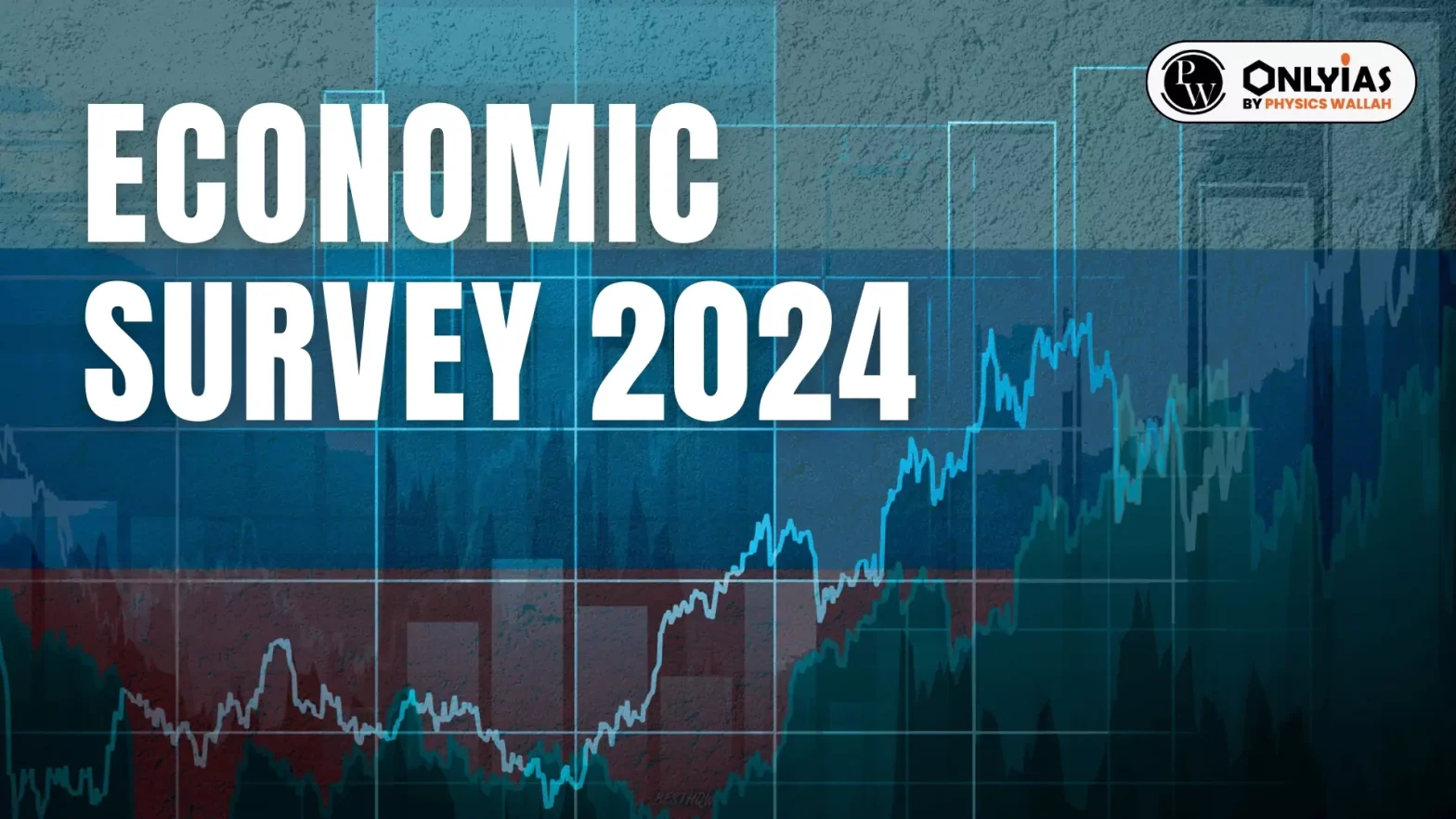The Economic Survey 2024, released on July 22, 2024, provides a detailed review of India's economic performance, projecting a 6.5-7% GDP growth for FY25, and highlights key sectors like agriculture, industry, and services. Check out to know more!

Economic Survey 2024 provides an in-depth analysis of the Indian economy over the past year, along with the future outlook. The Economic Survey 2024 has been released on July 22, 2024, a day ahead of ‘Union Budget 2024’. This year, the Economic Survey 2023–24 and the Union Budget 2024 have been delayed due to the general election, as presented by the Chief Economic Adviser, V. Anantha Nageswaran.
This comprehensive document is eagerly anticipated by economists, policymakers, scholars, and UPSC aspirants as it offers valuable insights into the country’s economic performance and policy recommendations.
The Economic Survey 2024, delivered by Finance Minister Nirmala Sitharaman, projects India’s GDP growth to be between 6.5-7% for FY25. It underscores stable economic growth, a reduction in inflation from 6.7% to 5.4%, and a robust recovery post-pandemic. Additionally, the survey addresses potential risks, including geopolitical conflicts and climate-related challenges. For a detailed analysis and to explore the comprehensive insights provided in the Economic Survey, you can download the Economic Survey 2024 PDF using the link below:
The Economic Survey of India is presented by the Government of India before the Union Budget. It is an essential annual report that reviews the economy’s development over the past year along with the performance of major development programs, and highlights the government’s policy initiatives.
The Economic Survey of India is crucial for understanding the country’s economic landscape. The Economic Survey 2024 examines multiple sectors, such as agriculture, industry, services, and infrastructure, offering insights into significant policy measures and their impacts.
| Economic Survey 2024 Key Highlights | |
| Particular | Details |
| History | First in 1950-51 |
| Presented By | Finance Minister of India |
| Prepared By | Department of Economic Affairs under Chief Economic Advisor V Anantha Nageswaran |
| Total Parts | Two, Part 1 and Part 2 |
| Release Date | 22 July 2024 |
| Constitutional Provision | No |
| Nature of Recommendations | Advisory |
| Importance | Provides insights for policymakers, informs about economic conditions, growth outlook |
| Official Website | https://www.indiabudget.gov.in/economicsurvey/ |
The Economic Survey 2024 has been released on July 22, 2024. It is released a day before the release Union Budget 2024-25. This timing allows for a detailed assessment of the previous fiscal year’s economic data and the incorporation of recent economic developments.
The Economic Survey of India is published by the Department of Economic Affairs under the Ministry of Finance, Government of India. The Chief Economic Advisor (CEA) to the Government of India usually plays a significant role in its preparation and presentation.
Ministry of Fina shares valuable insights into various aspects of the economy, including GDP growth, fiscal and monetary policy, external sector dynamics, employment trends, and social indicators.
The Economic Survey is an official report card on the government’s financial performance and the state of the economy during the year ending March 31. Released by the Ministry of Finance, it provides an outlook on future policy changes and is typically presented a day before the Union Budget.
Understanding how to read the Economic Survey 2024 is crucial for UPSC aspirants. Here are some tips:
The Economic Survey 2023-24 reflects India’s strong economic performance and strategic focus on growth, stability, and sustainability across various sectors. The government’s policies and initiatives are aimed at maintaining this positive trajectory while addressing challenges and capitalizing on opportunities for continued development. By thoroughly analyzing the Economic Survey 2024, one can gain a deeper understanding of the country’s economic trajectory and the policy measures required to achieve sustainable growth and development.
| Must Read | |
| NCERT Notes For UPSC | UPSC Daily Current Affairs |
| UPSC Blogs | UPSC Daily Editorials |
| Daily Current Affairs Quiz | Daily Main Answer Writing |
| UPSC Mains Previous Year Paper | UPSC Test Series 2024 |
The Economic Survey 2024 is an annual report presented by the Government of India, analyzing the economic performance of the past year and providing an outlook for the future.
The Economic Survey 2024 has been released on July 22, 2024.
The Economic Survey of India is published by the Department of Economic Affairs under the Ministry of Finance.
While the number varies, questions related to the Economic Survey frequently appear in both the Prelims and Mains exams, particularly in the Indian Economy and Social Issues sections.
It provides an analysis of the past year's economic performance, insights into various sectors, and recommends policy measures to drive future growth and development.
<div class="new-fform">
</div>